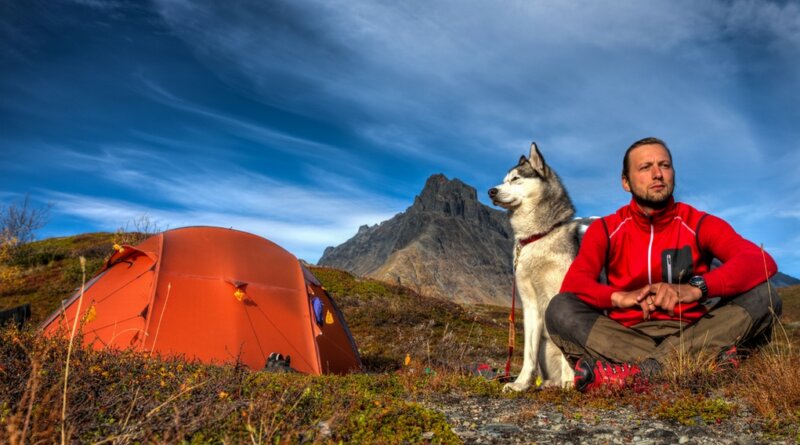12 Tips for Camping with Dogs to Ensure Safety, Comfort and a Good Time
There is nothing better than enjoying time in the great outdoors. Fresh air, peaceful silence and the smells of nature make camping a relaxing and enjoyable adventure. You can go camping alone to enjoy privacy and quiet, but it’s even better to go camping with dogs.
When going camping with your dog, you get the same perks of a solo expedition, without the disadvantages. So on your next trip, instead of paying a dog sitter or boarding kennel, why not bring your pet along with you? Just remember that along with ensuring your own safety when camping, you need to look out for the safety of your pooch as well.
1. Proper Medical Care Preparations
Of utmost importance is the medical care of your dog before, during, and after your camping expedition. Ensure your dog is vaccinated before going, especially against rabies. Apply flea and tick prevention to avoid infestation and tick-borne diseases such as Lyme Disease.
Remember to bring a pet first aid kit in case any accidents occur. After your trip (or a series of camping trips), it is also advisable to head to the vet for an exam, just in case. Your veterinarian will run a test and perform a checkup to make sure no intestinal parasites were ingested and that the dog doesn’t have fleas or ticks.
2. Bring the Right Type of Food
Part of making sure your dog doesn’t pick up parasites is to make sure you bring enough good-quality food to keep him from eating things out in the wild. Depending on how long you’re staying outdoors, some types of food are better and easier to store than others.
If you have an airtight container, then regular dry kibble is fine. If not, then dehydrated dog food is another great option. Dehydrated foods can be reconstituted with just water and are a healthy, protein-packed meal for your pooch that are easy to store. Note the weight light as well so as not to overload yourself.
3. Ensure Proper Hydration
Hydration for your dog is important not just for obvious reasons but also to make sure your dog doesn’t have any inclination to drink from standing pools of water, such as lakes. Dogs can pick up dangerous parasites from drinking such water or risk water intoxication.
Because water is heavy (more than 8 pounds per gallon), consider bringing a water filter or purifier if you’re planning to be out in the wilderness for multiple days. Have bottled water prepared for short trips, and bring at least one bottle of Pedialyte (and diluted it). It’s a safe way to give a dog electrolytes and better hydration if you are short on water.
4. Be Mindful of People Around You
You and the dog may not alone around the campsite, even if you intend to be. Hopefully your pooch is well-trained for basic commands. Make sure the dog is good with strangers, and watch out for whether or not other people have dogs with them as well.
At night, try to ensure that your dog doesn’t bark. This could disturb people nearby and possibly attract predators such as coyotes or wolves. Going camping with dogs means you need to spend some time with your pooch outdoors at night to ensure that he will be comfortable and quiet.
5. Dog Leashes and Training
If you plan on having your dog off-leash at the campsite at any point, the dog’s training and ability to follow commands is especially important. Make sure your dog knows how to instantly come to you when called, even if distracted by another animal.
Even if your plan is to mostly keep them off-leash, because there’s a lot going on while camping, you may eventually need to leash your pooch, so bring it with you. Depending on the location, some states prohibit this (especially if it’s a state park), so you may need to keep the dog in a crate, or leash your dog anyway around a tree or bring a stake and tie out.
6. Pepper Spray May Be Essential
Many campers choose to bring pepper spray along in case they encounter a bear, coyote, other wild animals or a human attacker. This is a good idea for your own safety, but if you employ the use of pepper spray or bear spray, remember your dog, too.
During camping, when there’s plenty of wildlife around, if your dog gets into a fight with another animal, never use a pepper spray to break up the fight. You’ll end up spraying your dog too, and the damage you do to your dog’s eyes could be irreversible. Instead, there are proper ways to break up such fights.
Moreover, if your dog does get into a fight with a wild animal, such as a raccoon, even if the fight ended quickly and there doesn’t appear to be any visible damage to your pooch, you’re likely need to head straight to the vet due to risk of rabies. Breaking up a dog vs raccoon fight (or other similar wild animal) should also be done carefully.
7. Appropriate Tent for You (and Maybe Your Dog, too)
Many first-time campers let their dogs sleep in their tents with them. It may be fine with your dog (depending on their size and temperament), but you might soon learn in the process that it is just better to get your dog their own tent instead.
While you want to protect your camping dog from the elements, weather, parasites and bugs at night time, you also want to ensure that your tent stays intact and clean, to an extent. Dog toenails can scratch and tear the tent lining very quickly. You may want to bring a dog sleeping bag to help with this problem, but that’s not always possible.
Dogs can also have accidents at night or inadvertently bring in fleas, ticks and other parasites into the tent to share with you. So consider buying and bringing a dog tent when camping. There are many options available such as this one from AmazonBasics, which is very cheap and also easy to put together.
8. Don’t Forget Your Backpack
Along with a tent, it is also a good idea to bring along not only your own backpack but also a dog backpack, so that your canine companion can help you carry some of the supplies if you intend to wander through the woods, go backpacking away from your campsite or simply go for a hike.
Sharing the burden of weight with your pup will help you tremendously. If you can saddle up your pooch with his own dog food, medical supplies, and tent, you are ahead of the game. This is also a great training practice and exercise for the dog, and it helps with dog-owner bond.
9. Consider Weather Conditions
Other than the most obvious camping dog gear and your own things, make sure to bring enough essential supplies to safe-guard yourself and the dog against possible cold and rain. If you’ll have a tent, that should be enough. If not, or if planning for long hikes, consider having a dog raincoat for your furry friend, along with a blanket for nighttime.
Rain is just one of the potential weather related problems. Snow, ice, cold and hot temperatures can also interfere with comfort. For example, if camping during hot weather in summer, pick a spot near a water source so that your dog can take a swim if the heat gets too intense. You could also bring a cooling vest to help the dog beat the heat.
10. Duration Of Your Stay
Try not to make your camping trip too long. Especially if it’s your first time camping with a dog, then one to three days should be the most you aim to spend around the campsite, unless you and your pet are seasoned campers and already have the strategy down.
Being outdoors is can be trying, risky, and tiring. You will also soon learn about things you forgot for the trip, and situations or risks you haven’t considered beforehand. On your next trip, you’ll be better prepared and you can stay camping with your dog longer.
Finally, since your pet can’t use words to communicate about them being tired, injured or dehydrated, you will need to set things up in a way where you don’t run these risks for your pooch. The best way to do that is by ensuring that the trip is short enough to both enjoy but not overstay your welcome with the nature.
11. Summary of Essential Dog Camping Supplies
Now you feel ready and prepared to go camping with dogs, and you at least know about things to be aware of. Here’s a summary and full list of all the essential dog supplies to bring with you when camping (minus the products that you might still want to consider for comfort but that aren’t essential for camping).
12. Anything Else?
Have you gone camping with a dog before and have some personal stories to share? What were the things you would have never considered and were surprised to discover during your very first dog camping trip? Share those in the comments below.
Some of my favorite tips were given by Redditors who go hiking and camping with their dogs on a regular basis. Here are four stories and pieces of advice I’d recommend to read about:
The general consensus is to always be prepared, and even over-prepared. Finally, you may also want to consider about not bringing your dog camping, because not every trip and not every location will be dog-friendly and might be too risky. Stay safe.
READ NEXT: How To Prepare Your Dog for Camping





